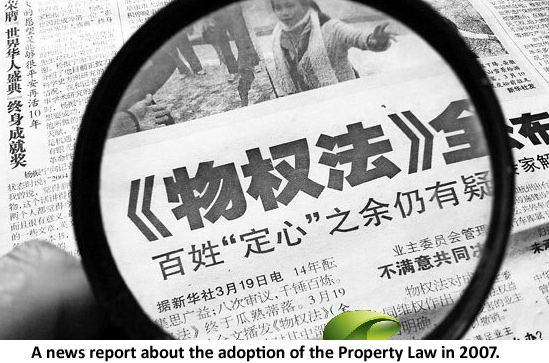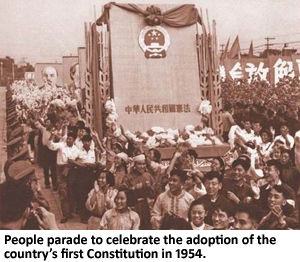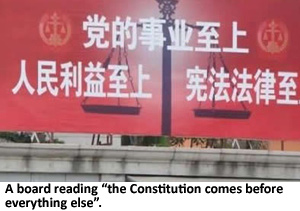PHOTO |
 China
World
Newsmaker
Slides
Weekly Photos
Share Your Photos
Special China
World
Newsmaker
Slides
Weekly Photos
Share Your Photos
Special
|
|
 |
Large Medium Small |
|
 Marriage Law: 1950
With the founding of New China in 1949, the old family and marriage institutions under the feudal system broke up. The new Marriage Law stipulates equality between men and women and monogamy. The law was superseded by a new version in 1981 after years of social turbulence that disturbed the stipulated family institution through 1957 to 1976.
Constitution: 1954 The first constitution of socialist China was founded. The last three versions of the law were carried out in 1975, 1978 and 1982. The 1982 version, the one still in effect, underwent four amendments. Criminal Law: 1979
The country's first criminal code had only 192 articles. After that, 25 specific criminal regulations and hundreds of criminal items in non-criminal laws were passed. Then the legislature tried to add all the regulations and items to the criminal amendments from 1982, and the work was finished in 1997. Criminal Procedure Law: 1979 The law clearly outlines the responsibilities of public security, the procuratorial organ and the court and better protects all parties. The General Rules of Civil Law: 1986
The rules of civil law were drafted in as early as 1954 and suspended several times since then, until 1986, when China adopted the reform and opening-up policy. The law adapts to the development of the market economy by adjusting property and personal relations among equal parties. It is a milestone marking the transition of Chinese society. Administrative Procedural Law:1989 Before the law was born, people had nowhere to lodge complaints against officials. The law ended the history of "officials administrating people but no complaints allowed." Civil Procedure Law: 1991 The law better protects civil rights of all parties in litigation and promotes impartial justice. With new changes in Chinese society since then, a new version of the law was adopted in 2007, when retrial and enforcement procedures were revised. Contract Law: 1999 China had several laws of this kind, which were left over from the planned economy before the 1990s. The Contract Law serves as a guiding principle for handling contract disputes against the backdrop of a market economy. Administrative Approval Law: 2003 With China's entry into WTO, protecting public interests and standardizing officials' administration became urgent. With this law, administrative organs took on a new look in terms of transformation of their functions - from an administrative government to a multi-functional one. Property Law: 2007
 The law went through the longest deliberation by the NPC because it adjusted the most complete property relations among different sectors. It recognizes and protects legal private properties and a combination of human rights protection and rule of law. |

 Sept 20, 1954: The first session of the First National People's Congress (NPC) adopted the country's first Constitution, which has 106 articles of four parts.
Jan 17, 1975:
The second version of the Constitution was approved by the first session of the Fourth NPC. This version has four parts with 30 articles.
March 5, 1978:
The first session of the Fifth NPC passed the third Constitution, which has 60 articles of four parts.
July 1, 1979:
The second session of the Fifth NPC adopted a resolution of regulations concerning amending the Constitution.
Dec 4, 1982:
The fourth version of the Constitution was passed by the fifth session of the Fifth NPC. This version consists of four parts with 138 articles and is the one still in effect now.
Since then, this version underwent four amendments.
April 12, 1988:
The first constitutional amendment was passed, stipulating the status and role of the private section. This is the first time that the Constitution is revised in the form of an amendment.
March 29, 1993:
The second constitutional amendment was passed and nine amendments were made. In this amendment, "primary stage of socialism," "the theory of building socialism with Chinese characteristics" and "persevering in reform and opening-up" were first introduced in the Constitution.
March 15, 1999:
The third, six amendments. Deng Xiaoping Theory was established as the guiding principle. "The principle of ruling the country by law" and "the basic economic system of our country at the present stage" were stipulated.
March 14, 2004:
The fourth. "Three Represents Theory" was written as a guiding principle. Protecting private property and strengthening the social security system were highlighted. More articles concerning respecting and guaranteeing human rights were added.
 |